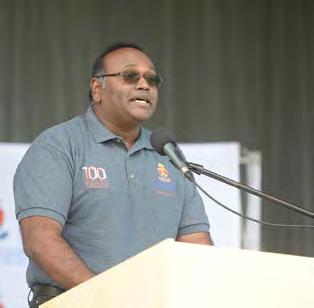Teaching and Learning Review 2020
appropriately—whether for IT, administration, or health services—is core. Analytics data post lockdown showed that students were consulting advisors on an even wider range of problems than before the lockdown. FSAs continued to support students online. Each FSA was provided with a tablet and mobile data. FSAs established advising via WhatsApp, which was welcomed by students. A ‘please call me’ service was also introduced to assist students who did not have access to mobile data or smart phones. To make FSA contact details more accessible, a dedicated web link was created10. The site provided a link to the online workshop series, also advertised on the FLY@UP website. The FSAs used the new online Learner Case Management System on their tablets to capture their interactions with students electronically. The FSAs used Blackboard Predict (an AIenabled analytics system) to identify students who were at risk of failing and to arrange oneon-one sessions with them. FSAs also helped with analytics data collection for some of the innovative student support initiatives. Despite all the successful interventions, clickUP data showed that 427 of the undergraduate students were still not active. The FSAs tried to contact all these students; 121 did not answer their phones and 100 indicated that they had deregistered. Many of the students indicated that they were fine and cited various reasons for low clickUP activity. However, 28 indicated the need for telephonic tutoring and 35 requested hardcopy material, although eventually 53 received printed material. All students have access to a study guide for each course. The study guides provide detailed information to students on how to prepare for each lecture session and provide a clear weekly work schedule and detailed assessment plans. In response to the information compiled by the FSAs, arrangements were made with a printer and courier services to ensure that identified students received their learning material. 10 https://www.up.ac.za/advising
FACULTY STUDENT ADVISOR REFLECTION: ‘The words that come to mind when I reflect on the experience of working from home and supporting students are: adaptability, resiliency, time management and, most importantly, self-care. I felt like technology provided us with the means to contact, assist and support students effectively while still attending to their personal needs. We conducted needs analyses of the students as well as the needs of the EBIT FSA team and together used this to inform our practice and make it meaningful. It is important the students felt heard, were reminded of their strengths and that they were not alone in this process. We normalised the experience and reminded students that we all had to make changes to cope during COVID-19. For me, a factor that contributed to working efficiently from home was setting boundaries professionally, creating a balance between personal and professional care so you are able to help students to the best of your ability. This was achieved by opening up channels of communication, providing different platforms for intervention (online, but both individual and group), keeping up to date with new technological advancements being made available and updating student resources to make it relevant for online studies and working from home.’
Tutoring Tutors are trained by education consultants in the Department for Education Innovation and lecturers to work with students in modules identified by each faculty. These are predominantly what the University terms ‘high impact modules’, usually first-year modules with large enrolments and serving students in multiple programmes. Modules impeding progress at any undergraduate year level might also appoint tutors.
For many years, a contact mode was the default for tutor training; the majority trained in late January. For the start of 2020, an online course was designed comprising ten videos, exploring three themes: the tutor, the student, and learning. In the tutor theme, the consultants discussed the roles and responsibilities of a tutor, characteristics of a good tutor, how to establish ground rules for a safe learning space and managing diversity. In the student theme, they considered how to handle difficult student types, the growth mind-set and learning, motivation and reflection. In the learning theme, they covered how learning works as well as questioning and study skills. The course takes about two hours to complete. Upon successful completion of the online course, tutors received a letter of participation. Faculties were consulted in January 2020 and the decision was made to retain a hybrid model with elements of contact to cater to faculties’ unique needs or give tutors hands-on practice. From May, tutoring continued online via the relevant modules’ clickUP courses. The head of e-learning and instructional designers added an online component to the tutor training course in April, to support tutors to work online using clickUP tools (quizzes, discussions and Collaborate). Fortunately, several departments had already been experimenting with online tutorials using Collaborate since 2013, so the University had experience in this mode. After the FSAs discovered that some students had no Internet access, the University introduced telephone tutoring services for those affected. Telephone tutors spent at least one hour per module, at least twice per week, helping the students assigned to them with their studies and advising them in respect of assessments. The tutors also informed FSAs and the Student Counselling Unit of students who required their intervention. The faculties identified 43 telephone tutors. The tutor training took place on 28 May and was attended by 37 telephone tutors. The EI Deputy Director: Academic Development managed the appointment of the telephone tutors centrally. A recording of the training and the PowerPoint
25












































